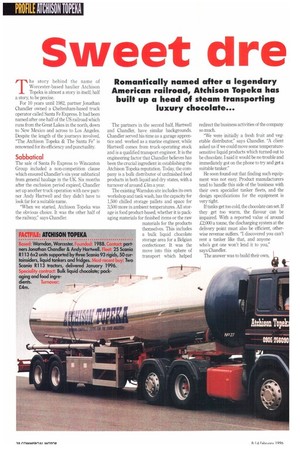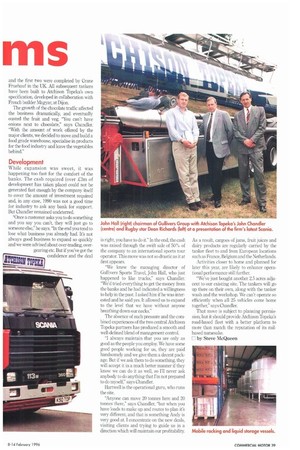PR LEAP' II TOPEKA
Page 40

Page 41

If you've noticed an error in this article please click here to report it so we can fix it.
Romantically named after a legendary American railroad, Atchison Topeka has built up a head of steam transporting luxury chocolate...
The story behind the name of Worcester-based haulier Atchison Topeka is almost a story in itself; half a story, to be precise.
For 10 years until 1982, partner Jonathan Chandler owned a Cheltenham-based truck operator called Santa Fe Express, It had been named after one half of the US railroad which runs from the Great Lakes in the north, down to New Mexico and across to Los Angeles. Despite the length of the journeys involved, The Atchison Topeka & The Santa Fe" is renowned for its efficiency and punctuality.
Sabbatical
The sale of Santa Fe Express to Wincanton Group included a non-competition clause which ensured Chandler's six-year sabbatical from general haulage in the UK. Six months after the exclusion period expired, Chandler set up another truck operation with new partner Andy Hartwell and they didn't have to look far for a suitable name.
When we started, Atchison Topeka was the obvious choice. It was the other half of the railway," says Chandler.
The partners in the second halt, Harwell and Chandler, have similar backgrounds. Chandler served his time as a garage apprentice and worked as a marine engineer, while Hartwell comes from truck-operating stock and is a qualified transport engineer. It is the engineering factor that Chandler believes has been the crucial ingredient in establishing the Atchison Topeka reputation. Today, the company is a bulk distributor of unfinished food products in both liquid and dry states, with a turnover of around Llm a year.
The existing Warndon site includes its own workshop and tank wash, has the capacity for 1,500 chilled storage pallets and space for 3,500 more in ambient temperatures. All storage is food product-based, whether it is packaging materials for finished items or the raw materials for the products themselves. This includes a bulk liquid chocolate storage area for a Belgian confectioner. It was the move into this sphere of transport which helped redirect the business activities of the company so much.
"We were initially a fresh fruit and vegetable distributor," says Chandler. "A client asked us if we could move some temperaturesensitive liquid products which turned out to be chocolate. I said it would be no trouble and immediately got on the phone to try and get a suitable tanker."
He soon found out that finding such equipment was not easy. Product manufacturers tend to handle this side of the business with their own specialist tanker fleets, and the design specifications for the equipment is very tight.
If tanks get too cold, the chocolate can set. If they get too warm, the flavour can be impaired. With a reported value of around £2,000 a tonne, the discharging system at the delivery point must also be efficient, otherwise revenue suffers. "I discovered you can't rent a tanker like that, and anyone who's got one won't lend it to you," says Chandler.
The answer was to build their own, and the first two were completed by Crane Fruehauf in the UK. All subsequent tankers have been built to Atchison Topeka's own specification, developed in collaboration with French builder Magyar, at Dijon.
The growth of the chocolate traffic affected the business dramatically, and eventually ousted the fruit and veg. "You can't have onions next to chocolate," says Chandler. "With the amount of work offered by the major clients, we decided to move and build a food grade warehouse, specialise in products for the food industry and leave the vegetables behind."
Development While expansion was sweet, it was happening too fast for the comfort of the banks. The cash required (over Om of development has taken place) could not be generated fast enough by the company itself to cover the amount of investment required and, in any case, 1990 was not a good time for industry to ask any bank for support. But Chandler remained undeterred.
"Once a customer asks you to do something and you say you can't, they will just go to someone else," he says. "In the end you tend to lose what business you already had. It's not always good business to expand so quickly and we were advised about over-trading, overgearing etc. But if you've gm the confidence and the deal
is right, you have to do it." In the end, the cash was raised through the swift sale of 50% of the company to an international sports tour operator. This move was not so drastic as it at first appears.
"We knew the managing director of Gullivers Sports Travel, John Hall, who just happened to like trucks," says Chandler. "We'd tried everything to get the money from the banks and he had indicated a willingness to help in the past. I asked him if he was interested and he said yes. It allowed us to expand to the level that we have without anyone breathing down our necks."
The absence of such pressure and the combined experiences of the two central Atchison Topeka partners has produced a smooth and well-defined blend of management control.
"I always maintain that you are only as good as the people you employ. We have some good people working for us, they are paid handsomely and we give them a decent package. But if we ask them to do something, they will accept it in a much better manner if they know we can do it as well, so I'll never ask anybody to do anything that I'm not prepared to do myself," says Chandler.
Hartwell is the operational guru, who runs the site.
"Anyone can move 20 tonnes here and 20 tonnes there," says Chandler, "but when you have loads to make up and routes to plan it's very different, and that is something Andy is very good at. I concentrate on the new deals, visiting clients and trying to guide us in a direction which will maintain our profitability.
As a result, cargoes of jams, fruit juices and dairy products are regularly carried by the tanker fleet to and from European locations such as France, Belgium and the Netherlands.
Activities closer to home and planned for later this year, are likely to enhance operational performance still further.
"We've just bought another 2.5 acres adjacent to our existing site. The tankers will go up there on their own, along with the tanker wash and the workshop. We can't operate so efficiently when all 25 vehicles come home together," says Chandler.
That move is subject to planning permission, but it should provide Atchison Topeka's road-based fleet with a better platform to more than match the reputation of its railbased namesake.
111 by Steve McQueen FACTFILE: ATCHISON TOPEKA Based: Warndon, Worcester. 1988. C,ontart part ners Jonathan Chandler & Andy Hartwell. leet: 25 Scania R113 6x2 units supported by three Scania 93 rigids, 50 curtainsiders, liquid tankers and fridges. Most recent buy: Two 5cania R113 tractors, delivered January 1996. Speciality contract: Bulk liquid chocolate; packaging and food ingre dients. Turnover: 2.4m. t




































































































